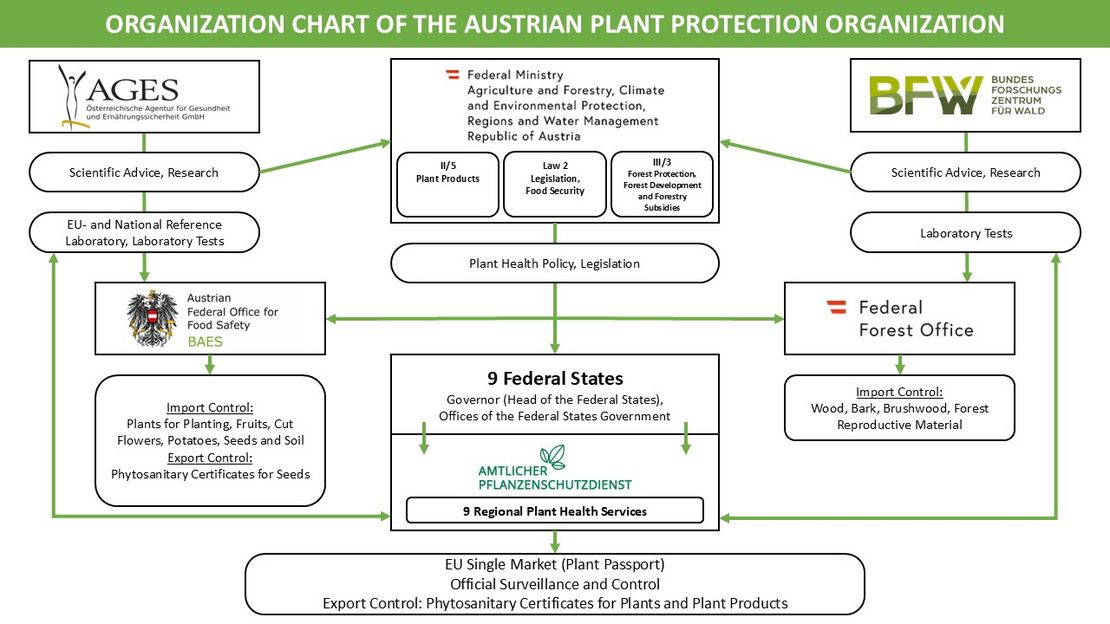Since mankind has been farming and trading in agricultural products, harmful organisms have been carried from their original habitat to new areas. For thousands of years, such distribution was limited to short distances within a continent. However, the risk of introducing harmful organisms into Europe and subsequently into Austria has increased in recent decades due to increasing global trade and rapid transport as well as the effects of climate change.
The first introductions into Europe with enormous social and economic consequences were Phytophthora infestans (potato late blight), which led to numerous crop failures and catastrophic famine in Ireland in 1845, and a few years later Daktulosphaira vitifoliae (phylloxera), which caused a significant collapse in grape and wine production for almost the whole of Europe. Once introduced into Europe, control over further dissemination was no longer possible. These lessons of the past were followed by an attempt to prevent their introduction through international cooperation.
In 1951, 15 European states joined together to form the European and Mediterranean Plant Protection Organization (EPPO), which today already has 51 members from Europe and the Mediterranean region. Also in the same year, the Food and Agricultural Organization (FAO) adopted the International Plant Protection Convention (IPPC), a treaty under international law for the protection of plants against harmful organisms.
Today, legal regulations at international and national level form the framework for plant health (phytosanitary) conditions for preventing the introduction and spread of harmful organisms for the protection of domestic agriculture and forestry.

The supreme authority of the Official Plant Protection Service is the Federal Ministry of Agriculture, Forestry, Climate and Environmental Protection, Regions and Water Management (BMLUK). The Federal Office for Food Safety and the Federal Office for Forests are the authorities of first instance for imports from third countries (e.g. phytosanitary import control, import wood control, packaging wood control).
At regional level(federal provinces), the provincial governor is responsible for carrying out all other tasks under the Plant Protection Act 2018. This includes the movement(phytosanitary internal market control) and export(phytosanitary export control) of plants, plant products and other objects, the registration/authorization of entrepreneurs to trade in plants and plant products as well as official measures to protect plants and plant products against the introduction of pests.
This area of responsibility is implemented by the 9 Regional Official Plant Protection Services of the federal states. You can find more information on this at: www.pflanzenschutzdienst.at
The Agency for Health and Food Safety (AGES) and the Federal Research Center for Forests provide support through scientific advice, research and laboratory tests.
The remit of the Official Plant Protection Service lies in official and coordinating activities in the context of plant health control:
Phytosanitary Controls
The Federal Office for Food Safety (BAES) is the authority of first instance for the implementation of the 4th section of the Plant Protection Act 2011 as amended.phytosanitary import control of plants, plant products and other objects from third countries in the agricultural sector, including the granting of derogations on import.
The phytosanitary export control and the phytosanitary domestic market control of plants, plant products and other objects is carried out by the Regional Official Plant Protection Services of the Länder. Further information can be found at: www.pflanzenschutzdienst.at
In the Official Gazette of the BAES, for example, the plant protection fee tariff, rules for inspections at the place of destination and conditions on sampling and on the official phytosanitary examination on the holding - agricultural part (compendium-LW) are defined and published.
Regulated pests
BAES reports the occurrence of legally regulated pests ( Union quarantine pests) in the agricultural sector to the Federal Ministry of Agriculture, Forestry, Climate and Environmental Protection, Regions and Water Management (BMLUK).
In accordance with the Plant Material Act 1997, as amended, § 13, the BAESis the competent authority for the certification of plant material of fruit species.
Legal Education
In addition, Austria-wide coordination and the provision of expertise in connection with the tasks of the Plant Protection Act (e.g. multi-year integrated control plan, harmful organisms) takes place, educational program) and cooperation with plant health authorities.